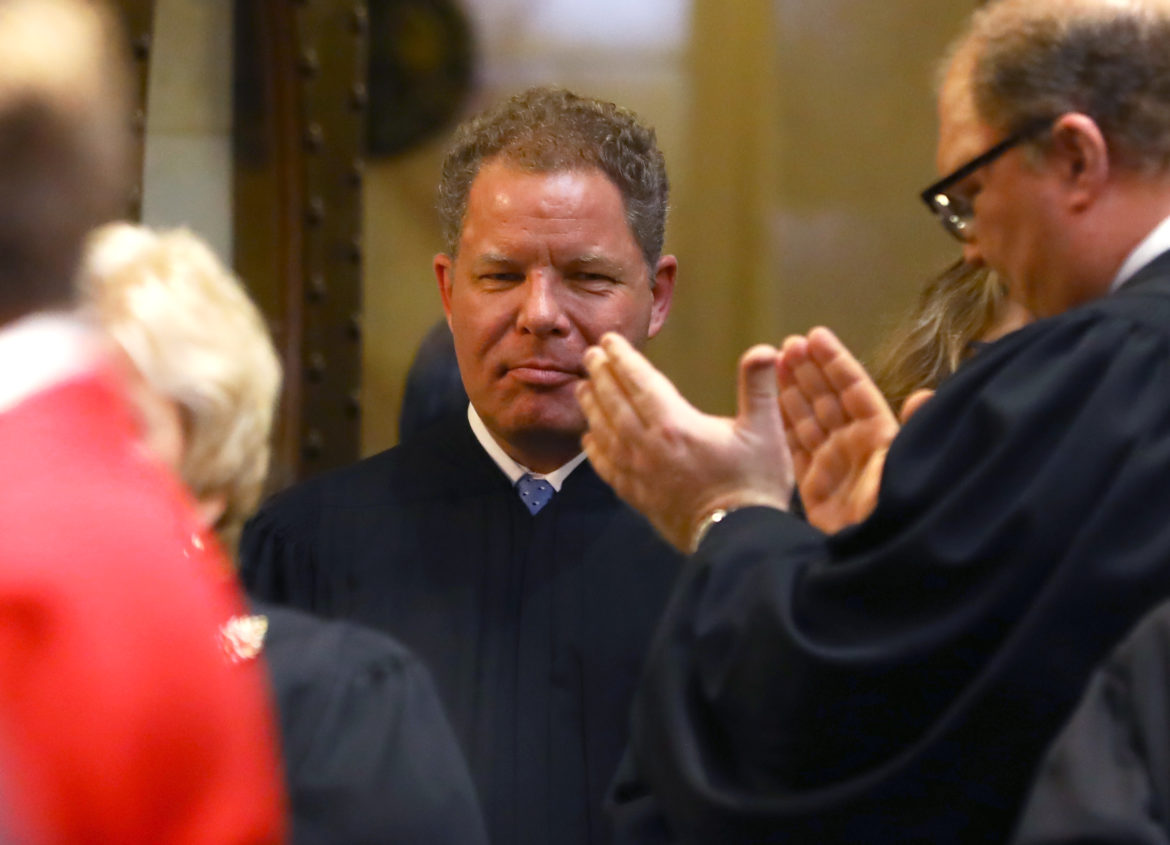Daniel Kelly Is Not a Good Legal Scholar
Even conservative justices have criticized his decisions for poor reasoning.

Daniel Kelly. Photo taken Jan. 10, 2017 by Coburn Dukehart / Wisconsin Center for Investigative Journalism.
As legal scholars interested in the coherent development of state law, we are deeply troubled by the candidacy of Daniel Kelly.
Kelly, a former Wisconsin Supreme Court Justice, has a history of poor legal reasoning from his previous time on the bench.
Dissenting opinions can be common on a contentious court, as is the case with the current U.S. Supreme Court. But Kelly’s opinions draw dissents not just because of ideological or political differences, but because of the poorly reasoned and irresponsible nature of his judging.
Kelly’s colleagues on the Wisconsin Supreme Court pinpoint basic judicial errors such as misreading simple language in a statute, ignoring straightforward statutory interpretations in favor of tortured ones, and misapplying judicial precedent.
Justice Patience Roggensack, a fellow conservative whose retirement precipitates this election, has dissented from five of Kelly’s opinions and wrote separate concurring opinions in five others. In State v. Brantner, Roggensack concurred with the result but filed a separate, sharply critical opinion:
Part of our obligation as supreme court justices is to take complicated legal issues and decide them in a way that simplifies and explains them. I write in concurrence because the majority opinion does the opposite. It takes a simple issue, possession, and makes it complicated. It also has the potential to confuse the meaning of possession, which is employed throughout Wisconsin’s criminal code.
In In re S.M.H., Kelly overturned a circuit court decision to terminate the parental rights of a chronically absentee father, citing “structural error.” This is what Justice Roggensack had to say:
Structural error is not a ‘legal rabbit’ that a court can pull out of its hat, and thereby avoid a thorough examination of the record and the legal principles that must be reviewed when a parent’s rights are terminated. Yet, that is just what the majority opinion has done today when it creates this new structural error, never before recognized by the United States Supreme Court or by this court.
Even in an opinion celebrated by some conservatives, Tetra Tech EC v Wisconsin Dept. of Revenue, another fellow conservative, Justice Annette Ziegler, concurred but blanched at the irresponsible step taken by Kelly to overrule decades of Wisconsin law, which provided that judges should defer to the judgment of state administrative agencies in areas where the agencies have expertise. Ziegler relied on statutory interpretation to reach the same outcome. She wrote of Kelly’s opinion: “This conclusion is either quite remarkable or quite unremarkable; that is, if the lead opinion is breaking new ground in defining the power of the judiciary, that is remarkable.”
For example, he opined that Wisconsin’s concealed carry statute pre-empted the City of Madison‘s longstanding rule against bringing dangerous objects onto buses (“pistols, rifles, knives or swords”) by citing the Second Amendment.
He ruled in Milewski v. Town of Dover, a property tax dispute, that the town tax assessor could be prevented from entering a private home for assessment purposes on, oddly enough, Fourth Amendment search and seizure grounds, which is a criminal procedure principle, not a property tax principle. Justice Roggensack agreed with the outcome but scolded: “I write separately because I conclude that the Milewskis are statutorily entitled to a hearing …. I would not address the constitutional issues discussed by the lead opinion.”
Mr. Kelly is a poor lawyer who lacks any sense of temperament. Wisconsin’s Supreme Court, and the people of Wisconsin, deserve better.
This op ed was first published by the Wisconsin State Journal.
Steph Tai is a law professor at the University of Wisconsin Law School and teaches in areas of administrative law, environmental law, and advanced contracts. Tahirih Lee was born and raised in Milwaukee, as were her parents. She is currently on the faculty of the Florida State University College of Law where she teaches and researches Chinese Law and Comparative Law. The authors are writing solely as private citizens, and our statements indicate neither support nor endorsement by our universities of a particular candidate.
Op-Ed
-
Wisconsin Candidates Decry Money in Politics, Plan to Raise Tons of It
 Dec 15th, 2025 by Ruth Conniff
Dec 15th, 2025 by Ruth Conniff
-
Trump Left Contraceptives to Rot; Women Pay the Price
 Dec 8th, 2025 by Dr. Shefaali Sharma
Dec 8th, 2025 by Dr. Shefaali Sharma
-
Why the Common Council’s Amended Budget is Good Policy for Milwaukee
 Nov 20th, 2025 by Alds. Marina Dimitrijevic and Russell W. Stamper, II
Nov 20th, 2025 by Alds. Marina Dimitrijevic and Russell W. Stamper, II




















“poor lawyer” is GOP codeword for “best lawyer ever”
Daniel Kelly is not a good legal scholar? Daniel Kelly is not a good PERSON.
The credibility of the legal profession has significantly diminished with Judges like Kelly who make up precedent and conjure up legal arguments to make political decisions which support right wing politicians and activists. We also have lawyers filing bogus law suits similar to voter fraud without rarely any real consequences outside of having the cases most always dismissed.